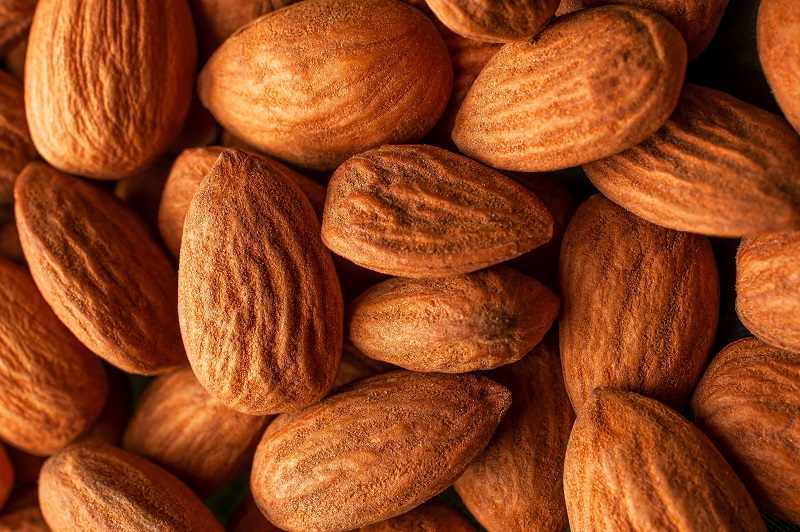Managing Risks And Reward Of Going High Density In Michigan
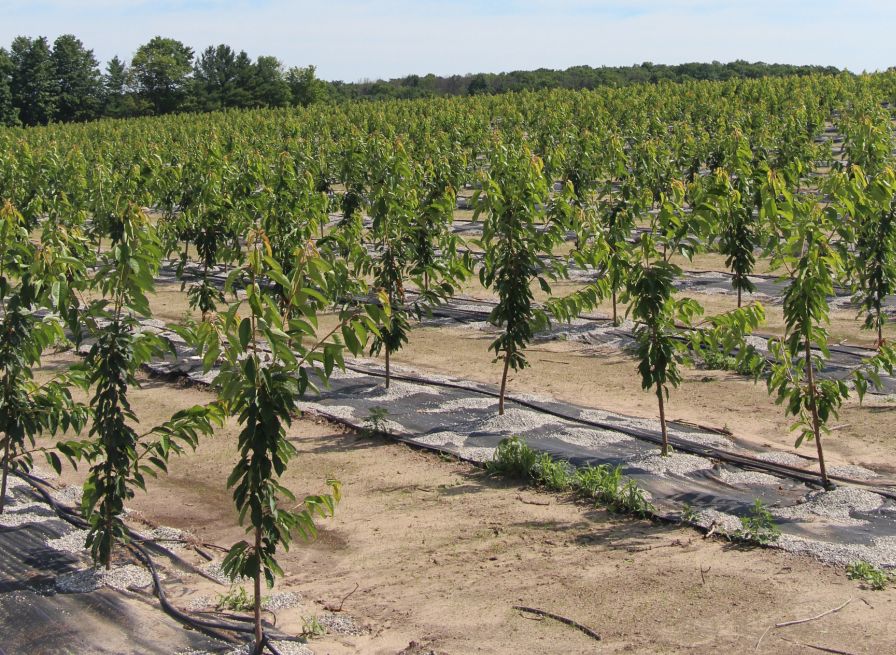 Risks are an indelible part of farming, and the challenge for most growers is how to best mitigate them while making decisions in the name of progress.
Risks are an indelible part of farming, and the challenge for most growers is how to best mitigate them while making decisions in the name of progress.
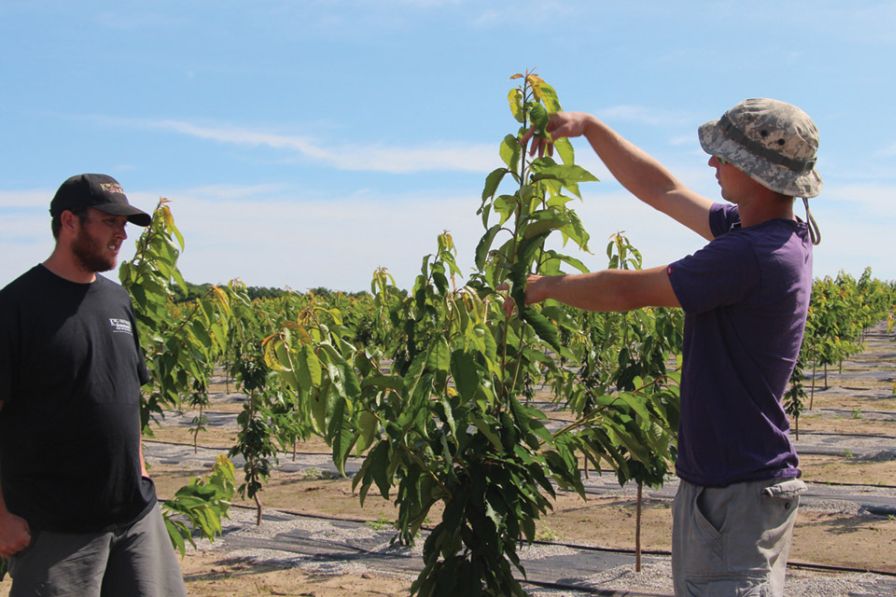
Mark Schiller, right, shows the type of growth desired in his family’s newest high density sweet cherry orchard while Jack King looks on. (Photo credit: Christina Herrick)
King Orchards in Central Lake, MI, is in such a place, where a burgeoning farm market and tart cherry extract businesses helps fuel two generations of growers to take more risks.
In fact, co-owner and first-generation grower John King says with pride, how vital the second-generation, including son Jack and nephew Mark Schiller, have been to the orchard.
The family has recently invested in weather stations in their apple blocks, and since they have two farm locations a few miles apart, it’s important to have real-time information at their fingertips. Information is also a critical piece of the puzzle for King Orchards’ most exciting new development: a new high-density sweet cherry planting.
Jack King says this progressive approach to all they do is a family affair.
“It would be hard to be a progressive grower without the multi-generational support,” he says.
A Sweet Decision
In fact, it’s that spirit of multi-general support which brought high density sweet cherries to King Orchards. John King says the success of this planting is due to Schiller and Jack King.
“The fact that we’re a first-generation grower make it easier to take risks,” John King says.
Jack King and Schiller worked with Greg Lang of Michigan State University to plant 14 acres of dwarfing sweet cherries on Gisela rootstocks at 12-by-6-feet. It’s just one of two dwarfing sweet cherry plantings the family has, with the intention of making it much easier for more people to come pick fruit off the tree.
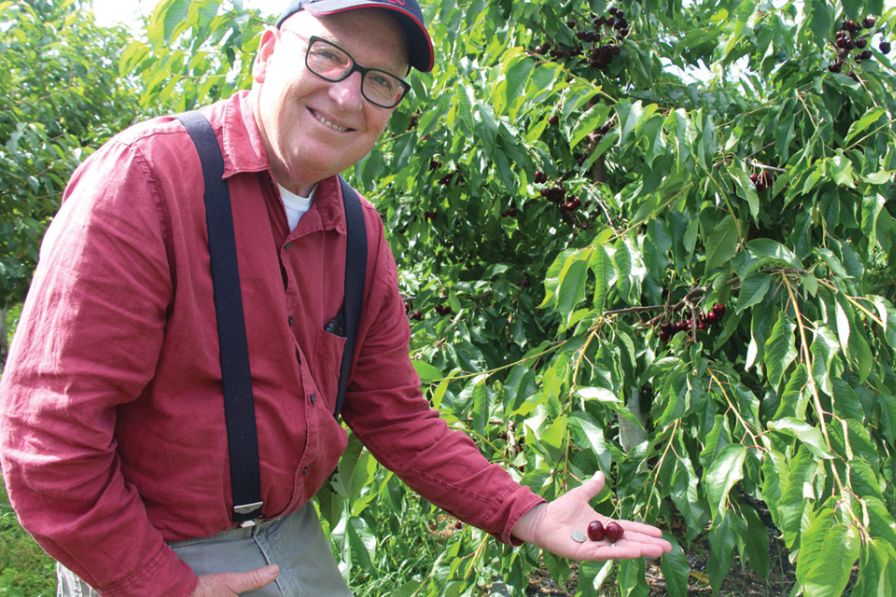
Sweet cherries larger than quarters as found in one of the family’s early high density sweet cherry blocks make John King smile. (Photo credit: Christina Herrick)
What makes this 14 acres different is the amount of detail the family put into the planting to ensure it would be successful. The trees were planted in April with GPS guidance.
“[Mark’s] rows are perfectly straight,” Jack King says.
The orchard was broken up into segments. There are five varieties in each group which includes four rows of late varieties and light cherry varieties and four rows of early varieties and light varieties as well as pollinators. The family has planted varieties such as ‘Emperor Francis,’ ‘Rainier,’ ‘Gold,’ ‘Sam,’ ‘Cavalier,’ ‘Ulster,’ — as well as some varieties in the Pearl series and a few more light cherry varieties. This planting was spaced with the intention of being able to spread out sprays.
“This is the first orchard where we’ve thought about coordinating sprays,” Schiller says. “We can isolate a block and still work in the orchard.”
Focus On Details
The family is also trying a new dark cherry, ‘Attika,’ which promises large fruit and late blooms. John King says he’s very proud of how his son and nephew, the second generation on the farm, have worked to get the planting in the great shape it is in.
“This has been where we’ve put all our energy this year,” says Schiller.
They’re taking a vigorous approach to wood renewal to ensure the largest cherries are grown.
“Every third year or so we will have cut out all the old wood to try to keep that new wood coming,” says John King.
Jack King adds, “We’re constantly growing new branches and keeping the vigor up.”
These plantings were started with trickle irrigation and the family went the extra step to add 18.9 miles of 4-foot-wide landscape fabric to keep weeds out of the orchard, instead of using herbicides. John King says these extra steps are vital to ensuring the blocks get into production successfully, with the growth they want.
“We’re going to be picking these in two years. We don’t want to make any mistakes,” he says.
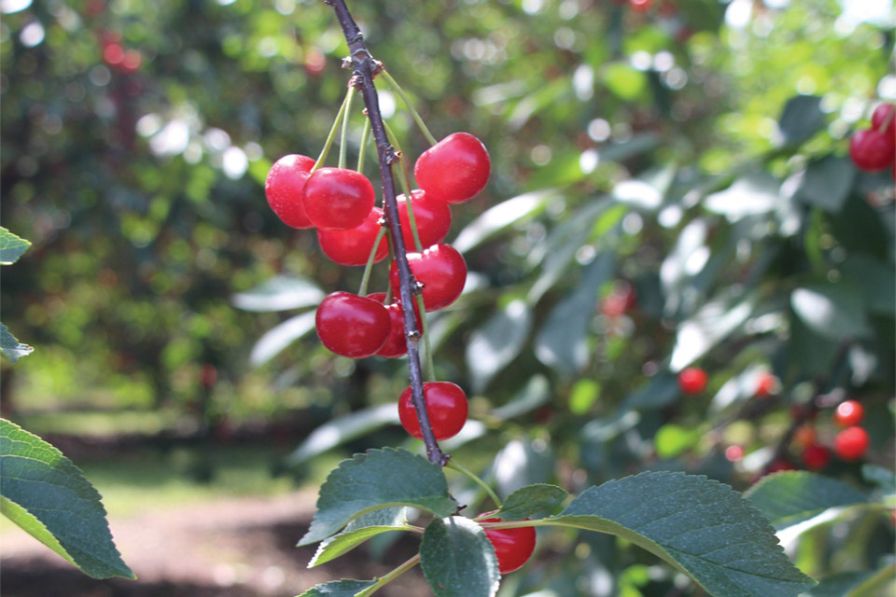
‘Montmorency’ tart cherries make up the lion’s share of the juice the King family sells. (Photo credit: Christina Herrick)
King Of Tart Cherries
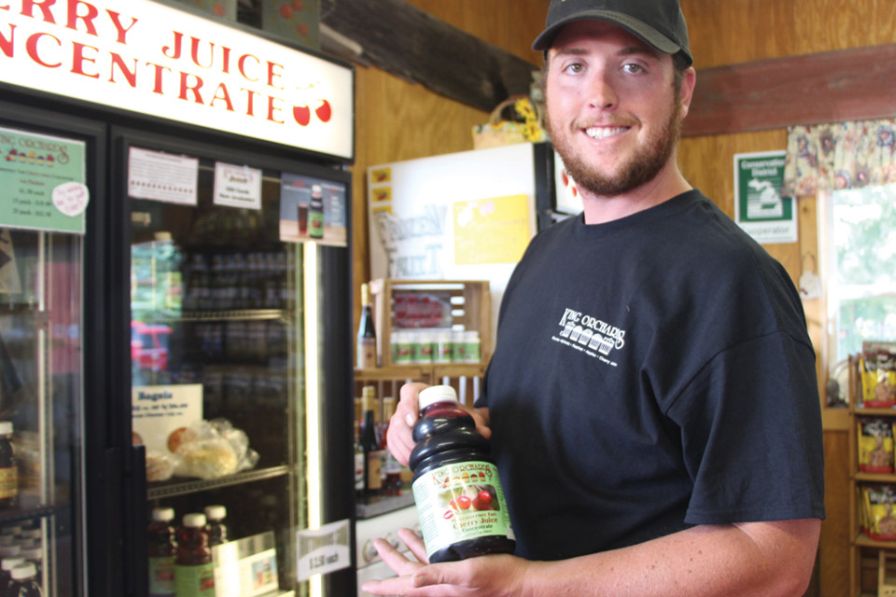
The King family bottles and sells tart cherry concentrate in their farm markets and online. Here, Jack King, poses with a bottle for sale in their retail market. (Photo credit: Christina Herrick)
While the King family is experimenting with their sweet cherry plantings, the family is making a name for themselves with their tart cherry business.
John and brother Jim King started in the tree fruit industry in Traverse City as farm employees. Jim bought a farm off of Michigan State Route 88 in 1980, and Jim bought land and joined the family business in 1985. Custom harvesting was a lot of their business early on.
They moved into a vertically integrated business and expanded their reach beyond custom harvesting by selling apples at farmer’s markets.
In 1999, the King family began selling tart cherry concentrate and went online with their products in the early 2000s. With the increased focus on the health benefits of tart cherries, the King family is poised to grow with the demand.
The family now has 160 acres of tart cherries, primarily ‘Montmorency,’ and about 10 acres ‘Balaton,’ most of which they harvest for juice. Some ‘Balatons’ are hand-picked for fresh market or processing.
“We’re really locked in on what we want,” Jim King says.
Juice is sold all the way from New York City to Vancouver, British Columbia, in gourmet stores. However, their biggest wholesale client is in the United Kingdom. In fact, they bottle six days out of the month for this one client.
The family recently upgraded their tart cherry concentrate bottling facility to be better positioned for more growth. This new facility produces 30 bottles a minute.
“I built it as big as I could wrap my mind around,” John King said.
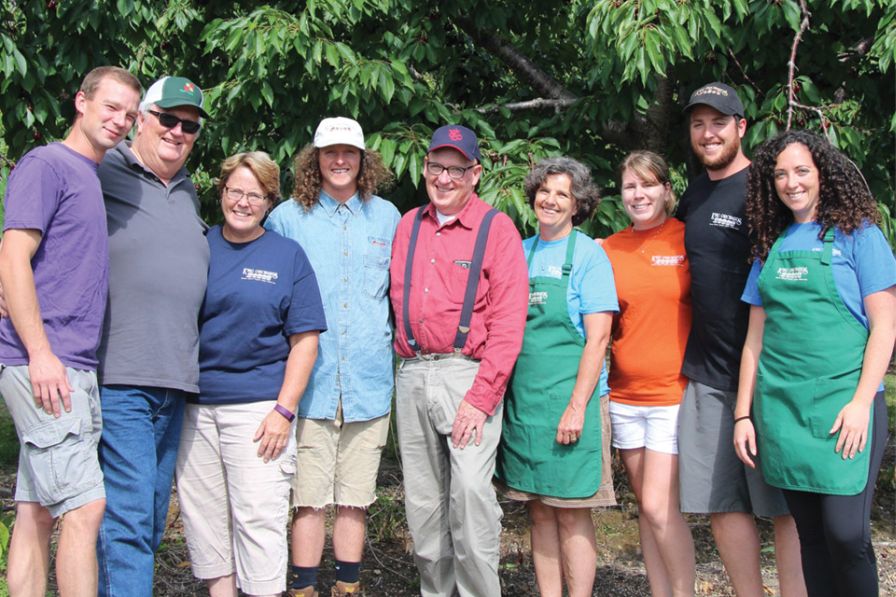
Each member of the King family contributes to the farm’s success — including Mark Schiller, Jim, Rose, Mark, John, Betsy, Courtney, Jack and Juliette King. (Photo credit: Christina Herrick)
Diversification: A Family Affair
It’s opening day of cherry picking season at King Orchard in Central Lake, MI, and the farm is a blur of activity. Some family members are making sure the market is open and ready for customers, while others are
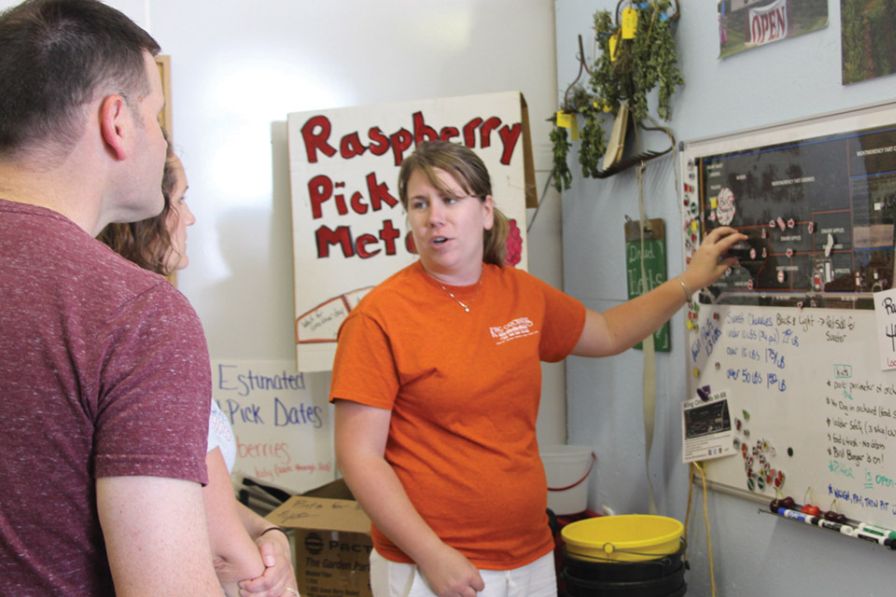
Courtney King uses an orchard map to help pickers find the best fruit in the pick-your-own orchards. (Photo credit: Christina Herrick)
coming in from a morning of preventative sprays thanks to a recent storm.
The King family is all hands on deck. Co-owners John and Jim’s wives, Betsy and Rose, man the farm market, with assistance from second-generation grower Jack’s wife, Courtney. John and Betsy’s daughter, Juliette, runs the pitting machine for cherry pickers.
John and Betsy’s son, Mike, was out in the orchard spraying, too, with Jim’s son-in-law Mark Schiller.
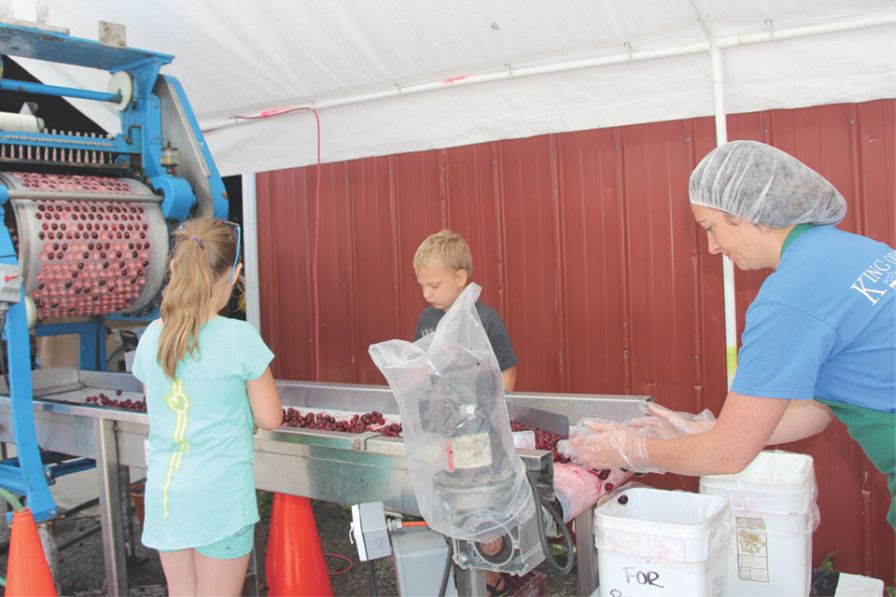
Juliette King, right, assists some young helpers process sweet cherries that pass through the orchard’s pitter. (Photo credit: Christina Herrick)
Just two days earlier, a hail storm rolled through the Traverse City area with 80-90 mph wind gusts, battering many orchards. Though some escaped damage, the King family’s orchard, located in a watershed called the Chain of Lakes, did not. But there’s no time to dwell on what happened. It’s time to focus on what’s to come this weekend, when they’re expecting more than 250 customers.
It’s one of the busiest days of the year, second-generation grower Jack King says, and there’s talk of how to handle the crowd.
“We’ve outgrown our parking,” says King, whose family farm started in the 1980s.
King says the family has a plan to move the shop away from the market to make more room for parking and farm market activities so they can better handle crowds in the future.
John King and son Jack and nephew Mark Schiller all agree diversification is essential to their farm – they grow everything from strawberries and asparagus early in the season, to stone fruit, pears, and sweet corn, and then apples and pumpkins in the fall.
Diversification means that when one crop sustains damage, the season isn’t lost. It also means more work, says John King.
“Diversification means no one has a day off,” he says.







